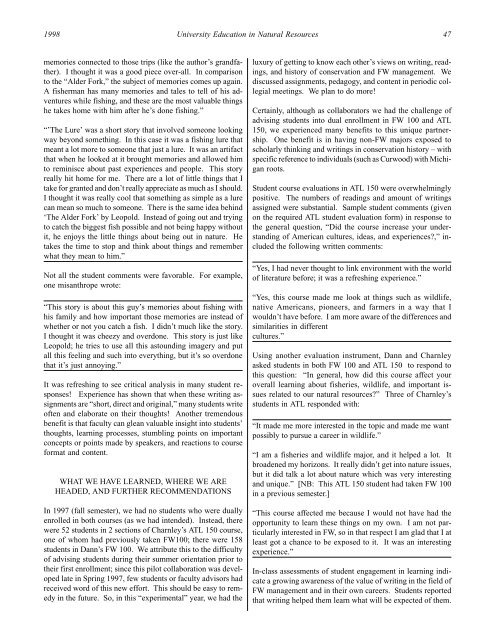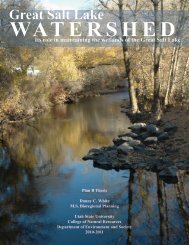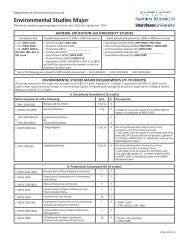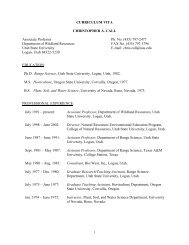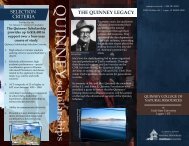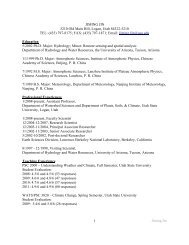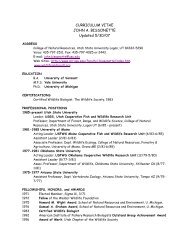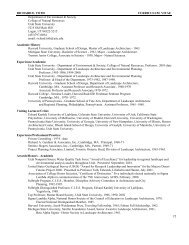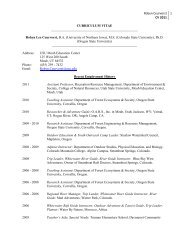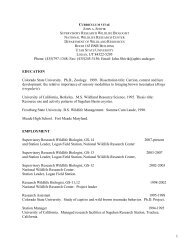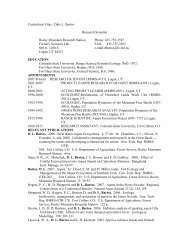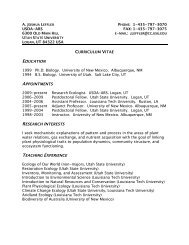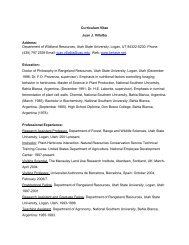University Education in Natural Resources - CNR Home - Utah State ...
University Education in Natural Resources - CNR Home - Utah State ...
University Education in Natural Resources - CNR Home - Utah State ...
You also want an ePaper? Increase the reach of your titles
YUMPU automatically turns print PDFs into web optimized ePapers that Google loves.
1998<br />
<strong>University</strong> <strong>Education</strong> <strong>in</strong> <strong>Natural</strong> <strong>Resources</strong> 47<br />
memories connected to those trips (like the author’s grandfather).<br />
I thought it was a good piece over-all. In comparison<br />
to the “Alder Fork,” the subject of memories comes up aga<strong>in</strong>.<br />
A fisherman has many memories and tales to tell of his adventures<br />
while fish<strong>in</strong>g, and these are the most valuable th<strong>in</strong>gs<br />
he takes home with him after he’s done fish<strong>in</strong>g.”<br />
“’The Lure’ was a short story that <strong>in</strong>volved someone look<strong>in</strong>g<br />
way beyond someth<strong>in</strong>g. In this case it was a fish<strong>in</strong>g lure that<br />
meant a lot more to someone that just a lure. It was an artifact<br />
that when he looked at it brought memories and allowed him<br />
to rem<strong>in</strong>isce about past experiences and people. This story<br />
really hit home for me. There are a lot of little th<strong>in</strong>gs that I<br />
take for granted and don’t really appreciate as much as I should.<br />
I thought it was really cool that someth<strong>in</strong>g as simple as a lure<br />
can mean so much to someone. There is the same idea beh<strong>in</strong>d<br />
‘The Alder Fork’ by Leopold. Instead of go<strong>in</strong>g out and try<strong>in</strong>g<br />
to catch the biggest fish possible and not be<strong>in</strong>g happy without<br />
it, he enjoys the little th<strong>in</strong>gs about be<strong>in</strong>g out <strong>in</strong> nature. He<br />
takes the time to stop and th<strong>in</strong>k about th<strong>in</strong>gs and remember<br />
what they mean to him.”<br />
Not all the student comments were favorable. For example,<br />
one misanthrope wrote:<br />
“This story is about this guy’s memories about fish<strong>in</strong>g with<br />
his family and how important those memories are <strong>in</strong>stead of<br />
whether or not you catch a fish. I didn’t much like the story.<br />
I thought it was cheezy and overdone. This story is just like<br />
Leopold; he tries to use all this astound<strong>in</strong>g imagery and put<br />
all this feel<strong>in</strong>g and such <strong>in</strong>to everyth<strong>in</strong>g, but it’s so overdone<br />
that it’s just annoy<strong>in</strong>g.”<br />
It was refresh<strong>in</strong>g to see critical analysis <strong>in</strong> many student responses!<br />
Experience has shown that when these writ<strong>in</strong>g assignments<br />
are “short, direct and orig<strong>in</strong>al,” many students write<br />
often and elaborate on their thoughts! Another tremendous<br />
benefit is that faculty can glean valuable <strong>in</strong>sight <strong>in</strong>to students’<br />
thoughts, learn<strong>in</strong>g processes, stumbl<strong>in</strong>g po<strong>in</strong>ts on important<br />
concepts or po<strong>in</strong>ts made by speakers, and reactions to course<br />
format and content.<br />
WHAT WE HAVE LEARNED, WHERE WE ARE<br />
HEADED, AND FURTHER RECOMMENDATIONS<br />
In 1997 (fall semester), we had no students who were dually<br />
enrolled <strong>in</strong> both courses (as we had <strong>in</strong>tended). Instead, there<br />
were 52 students <strong>in</strong> 2 sections of Charnley’s ATL 150 course,<br />
one of whom had previously taken FW100; there were 158<br />
students <strong>in</strong> Dann’s FW 100. We attribute this to the difficulty<br />
of advis<strong>in</strong>g students dur<strong>in</strong>g their summer orientation prior to<br />
their first enrollment; s<strong>in</strong>ce this pilot collaboration was developed<br />
late <strong>in</strong> Spr<strong>in</strong>g 1997, few students or faculty advisors had<br />
received word of this new effort. This should be easy to remedy<br />
<strong>in</strong> the future. So, <strong>in</strong> this “experimental” year, we had the<br />
luxury of gett<strong>in</strong>g to know each other’s views on writ<strong>in</strong>g, read<strong>in</strong>gs,<br />
and history of conservation and FW management. We<br />
discussed assignments, pedagogy, and content <strong>in</strong> periodic collegial<br />
meet<strong>in</strong>gs. We plan to do more!<br />
Certa<strong>in</strong>ly, although as collaborators we had the challenge of<br />
advis<strong>in</strong>g students <strong>in</strong>to dual enrollment <strong>in</strong> FW 100 and ATL<br />
150, we experienced many benefits to this unique partnership.<br />
One benefit is <strong>in</strong> hav<strong>in</strong>g non-FW majors exposed to<br />
scholarly th<strong>in</strong>k<strong>in</strong>g and writ<strong>in</strong>gs <strong>in</strong> conservation history – with<br />
specific reference to <strong>in</strong>dividuals (such as Curwood) with Michigan<br />
roots.<br />
Student course evaluations <strong>in</strong> ATL 150 were overwhelm<strong>in</strong>gly<br />
positive. The numbers of read<strong>in</strong>gs and amount of writ<strong>in</strong>gs<br />
assigned were substantial. Sample student comments (given<br />
on the required ATL student evaluation form) <strong>in</strong> response to<br />
the general question, “Did the course <strong>in</strong>crease your understand<strong>in</strong>g<br />
of American cultures, ideas, and experiences?,” <strong>in</strong>cluded<br />
the follow<strong>in</strong>g written comments:<br />
“Yes, I had never thought to l<strong>in</strong>k environment with the world<br />
of literature before; it was a refresh<strong>in</strong>g experience.”<br />
“Yes, this course made me look at th<strong>in</strong>gs such as wildlife,<br />
native Americans, pioneers, and farmers <strong>in</strong> a way that I<br />
wouldn’t have before. I am more aware of the differences and<br />
similarities <strong>in</strong> different<br />
cultures.”<br />
Us<strong>in</strong>g another evaluation <strong>in</strong>strument, Dann and Charnley<br />
asked students <strong>in</strong> both FW 100 and ATL 150 to respond to<br />
this question: “In general, how did this course affect your<br />
overall learn<strong>in</strong>g about fisheries, wildlife, and important issues<br />
related to our natural resources?” Three of Charnley’s<br />
students <strong>in</strong> ATL responded with:<br />
“It made me more <strong>in</strong>terested <strong>in</strong> the topic and made me want<br />
possibly to pursue a career <strong>in</strong> wildlife.”<br />
“I am a fisheries and wildlife major, and it helped a lot. It<br />
broadened my horizons. It really didn’t get <strong>in</strong>to nature issues,<br />
but it did talk a lot about nature which was very <strong>in</strong>terest<strong>in</strong>g<br />
and unique.” [NB: This ATL 150 student had taken FW 100<br />
<strong>in</strong> a previous semester.]<br />
“This course affected me because I would not have had the<br />
opportunity to learn these th<strong>in</strong>gs on my own. I am not particularly<br />
<strong>in</strong>terested <strong>in</strong> FW, so <strong>in</strong> that respect I am glad that I at<br />
least got a chance to be exposed to it. It was an <strong>in</strong>terest<strong>in</strong>g<br />
experience.”<br />
In-class assessments of student engagement <strong>in</strong> learn<strong>in</strong>g <strong>in</strong>dicate<br />
a grow<strong>in</strong>g awareness of the value of writ<strong>in</strong>g <strong>in</strong> the field of<br />
FW management and <strong>in</strong> their own careers. Students reported<br />
that writ<strong>in</strong>g helped them learn what will be expected of them.


